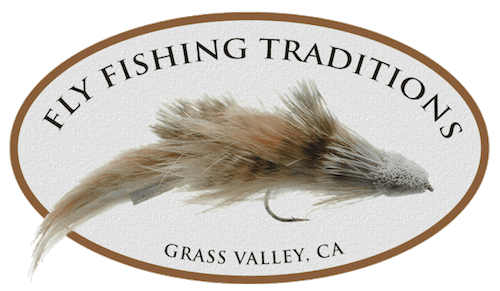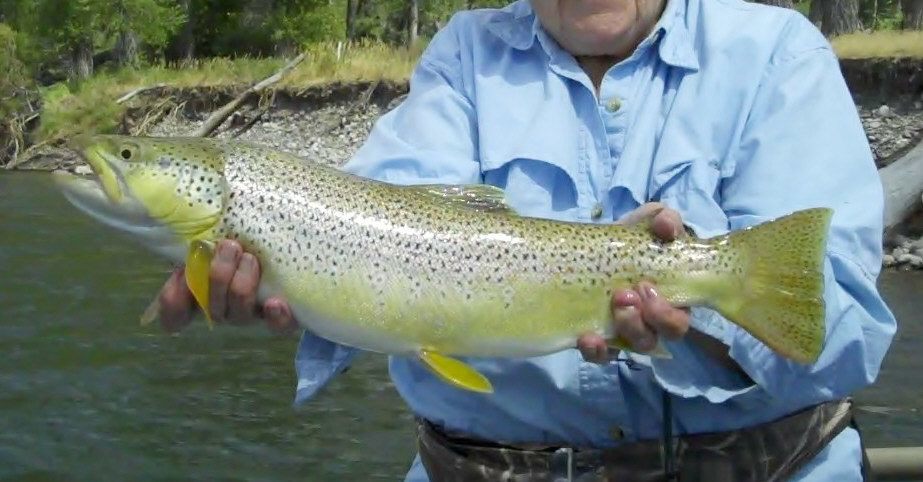A trophy Yellowstone Brown taken on the Mayors Landing to Pig Pen Float
The Waters Below Livingston
When selecting a section of the Yellowstone river to fish, and if you’re thinking trophy trout heading to the river below Livingston is a good bet. The river below Livingston holds less trout per mile but makes it up in poundage. In early summer after the runoff you’ll be casting streamers to the bank or above and below mid stream boulders, convergent flows where side channels and the main river come together. You’ll dead drift streamers with nymph droppers along rip-rap banks and in big pools. Hoppers will come into play later on.
You will find Brown Trout, Rainbows, an occasional cutthroat and not so many whitefish on the water below Livingston.
The Yellowstone below the town of Livingstone takes on the characteristics if a major river. It is big, wide and can be somewhat brawling in the early summer. The river itself is characterized by, long runs with good bank water, riffles and tailouts, deep pools, huge eddies, and many braided side channels. There are some major wave rides, some big drops over in-stream boulders the size of a house, (although you can easily avoid them). I felt very comfortable in my Fishcraft raft, but would have been extremely uncomfortable in my low side Hyde drift boat. This section of the river is mainly class I and class II water if you scout the river properly. Class III in a couple of areas if you don’t and make a mistake.
I am speaking from the experience of running about 12 miles of river from Mayors Landing in Livingston town to a take out called “Pig Farm”. I was told it was named after an old farm that raised pigs at the site of the takeout and also that the run above the take out holds some of the largest trout in the river, earning the title “Pig Farm”. I like the second story.
Fishing Techniques
I fished this section with my Mom and Dad when the river was running about 5500 cfs. and the visibility was about 5 to 6 ft. It was a bright day and you could clearly see the bottom in the 4 to 5 foot runs and the tailouts. We concentrated on the sanctuary water and holding areas. There are a banks that have rip-rapped banks to stabilize the banks. These banks have been stacked with angular boulders and are steep and deep. There are holding areas all along these banks. This creates a brown trout hotel. We had great success firing our flies to all the pockets all these banks. A fish would dart out of it’s lie and slam a streamer and then when hooked dart back into the rocks. We hooked but then lost quite a few really large fish using this technique. We also landed quite a few.
Rigging
We rigged up similar to the way we rigged for the “Bird Float” with streamers with droppers. We beefed up our tippet expecting larger fish.
Leader – 7 1/2 foot 2x tapered leader
Indicator – Large Thing-a-ma-bobber
Shot – 1 or 2 AB’s 3 to 7 feet below the indicator.
1st Fly – 10 ” of 3x fluorocarbon Streamer patterns, McCunes Sculpin, Rubber Legs with Marabou tail, Whitefish Minnow
2nd Fly – 20″ of 4x fluorocarbon, beadhead PT’s, beadhead yellow stones, beadhead lightning bugs, caddis nymphs/emergers
Techniques
I rigged up for bigger fish and we concentrated on techniques that would give us a chance to hook larger fish. We would alternate between streamer techniques and dead drifting techniques.
By rigging with a streamer and a trailing nymph we could fish using streamer techniques or dead drift the streamer/dropper in the runs and pools. We used streamer and dead drift indicator nymphing at the same time.
The deeper bank water with holding lies out of the current was targeted as we floated down the river. We would cast to these spots and actively strip the streamer out into the current, pick up and cast again to the next good looking spot. These are the money spots.
The alternative technique was to fire a cast into likely looking holding water at the bank, strip it out and if there was no takers, throe an upstream stack mend and dead drift the rigg along the bank 2 to 4 feet off the bank.
Both techniques were productive.
Mayors Landing to Pig Pen Photos
 This is a photo of my “Fishcraft” raft. It is the perfect boat for exploring new rivers and is safe in almost any Class I to Class III water.
This is a photo of my “Fishcraft” raft. It is the perfect boat for exploring new rivers and is safe in almost any Class I to Class III water.
 The river gets big below Livingston and the banks are lined with willows and cottonwoods.
The river gets big below Livingston and the banks are lined with willows and cottonwoods.
 As you float below Livingston you will come to these bluffs with great pools and undercuts at the base.
As you float below Livingston you will come to these bluffs with great pools and undercuts at the base.
These offer great holding water and is where deep indicator nymphing is productive.
 My Mom with a nice rainbow caught dead drifting along the rocky banks.
My Mom with a nice rainbow caught dead drifting along the rocky banks.
 My mom, Geri, with a trophy, fish of a lifetime for most people, caught on a beadhead Lighting Bug which was trailing a McCunes Sculpin. We had been fishing the bank water and I was scouting the water ahead when I saw a side channel converging back to the main channel. There was a spit of gravel bank running to a point and where the waters converged it created a long vee with glassy slow current, The water was about 4 to 6 feet deep. I said to my mom who was in the front of the boat, “Hey, Mom, cast into that slack water on river left into that vee, that the type of water where fish like to hang out”. She turned and put here rigg in and the next thing I knew I saw this huge fish come busting out of the water. My eyes about popped out of my head. As she kept tension on the fish I rowed back to the river right and found some slower water to attempt to land it. With a keystone cop atmosphere and the boat continuing downstream we managed somehow to coax the fish into the net. Geri’s smile tells the rest.
My mom, Geri, with a trophy, fish of a lifetime for most people, caught on a beadhead Lighting Bug which was trailing a McCunes Sculpin. We had been fishing the bank water and I was scouting the water ahead when I saw a side channel converging back to the main channel. There was a spit of gravel bank running to a point and where the waters converged it created a long vee with glassy slow current, The water was about 4 to 6 feet deep. I said to my mom who was in the front of the boat, “Hey, Mom, cast into that slack water on river left into that vee, that the type of water where fish like to hang out”. She turned and put here rigg in and the next thing I knew I saw this huge fish come busting out of the water. My eyes about popped out of my head. As she kept tension on the fish I rowed back to the river right and found some slower water to attempt to land it. With a keystone cop atmosphere and the boat continuing downstream we managed somehow to coax the fish into the net. Geri’s smile tells the rest.
Summary
So if your in the Bozeman/Livingston area and decide to give the Yellowstone a try, don’t forget that there are options other than fishing the waters of Paradise Valley. Maybe do like we did and fish different sections of the river from below Gardner, in Paradise Valley, but don’t forget below Livingston.

